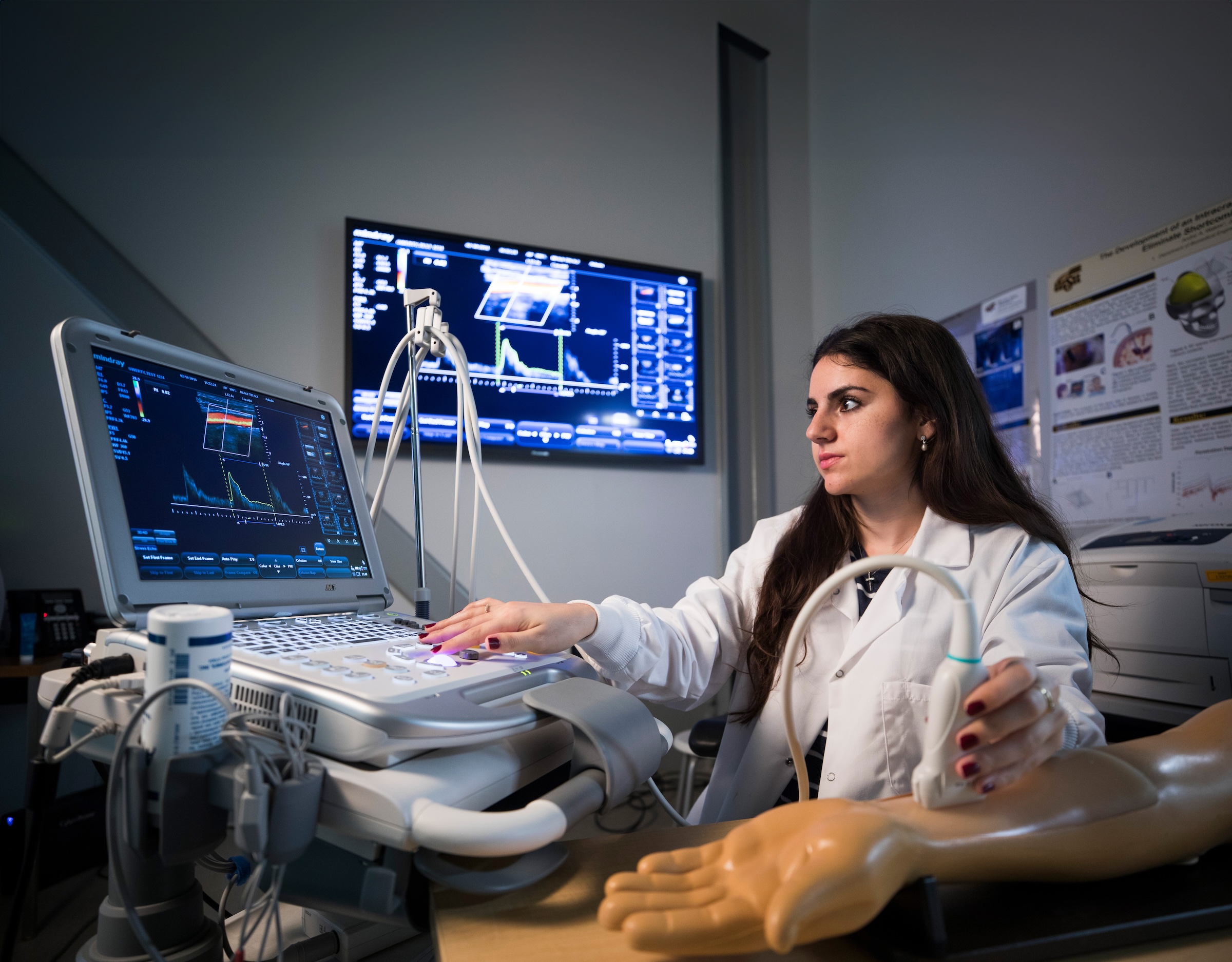Doctor of Philosophy in Biomedical Engineering
Our Doctor of Philosophy in Biomedical Engineering will prepare you for high-paying, high-demand careers designing the medical technology of the future. You’ll have access to state-of-the-art biomedical engineering labs and the chance to work with faculty and industry professionals on campus and throughout Kansas’ largest city.
Admission to the Program
The minimum requirements for admission to the Doctor of Philosophy in Biomedical Engineering program include:
- A master's or bachelor's degree in a discipline relevant to biomedical engineering;
- A transcript from each institution attended;
- For students admitted from an undergraduate degree: A minimum GPA of 3.500 for all undergraduate coursework and a minimum GPA of 3.250 for any completed graduate coursework;
- For students admitted from a master's degree: A minimum GPA of at least 3.250 for all graduate-level coursework;
- A statement of purpose including a section on research interests;
- Graduate Record Examination (GRE) scores;
- Three letters of recommendation; and
- English proficiency examination for international applicants who have not studied at an English speaking university: TOEFL or other university approved examination.
Applicants may request a waiver of some of the above requirements for admission if sufficient evidence is provided to the Biomedical Engineering Graduate Admissions Committee for review. Students entering the Doctor of Philosophy in Biomedical Engineering program are expected to have already completed the following courses or their equivalents: Biology I, Anatomy and Physiology, General Chemistry (Chemistry I and II), Physics I, Math (Calculus I and II, Differential Equations), Circuits, Thermodynamics, Statics, Statistics, and programming. If prior coursework deficiencies exist, a student may be admitted on a conditional basis. It is recommended that as much of the deficient coursework as possible be completed prior to beginning graduate study.
For further information regarding admissions to the Doctor of Philosophy in Biomedical Engineering program, contact the Department of Biomedical Engineering graduate coordinator.
Program Requirements
1. Degree Options
The Doctor of Philosophy in Biomedical Engineering curriculum consists of a minimum of 72 total credit hours which includes:
| Course | Title | Hours |
|---|---|---|
| 36 credit hours of coursework (including a maximum of 24 credit hours from a master's degree) | 36 | |
| BME 877 | BME Graduate Seminar (for at least two semesters) | 0 |
| 12 credit hours of additional coursework, dissertation or a combination of both | 12 | |
| A minimum of 24 dissertation credit hours | 24 | |
| Total Credit Hours | 72 |
In consultation with an advisor, up to 48 credit hours of elective courses can be selected from the following subjects: BME, ME, ECE, CS, IME, AE, BIOL, CHEM, HPS and PSY.
2. Qualifying Exam
- Time:
BME PhD students must make the first attempt of the qualifying exam no earlier than the second semester but no later than the third semester of enrollment, with their advisor’s approval. To be eligible for the exam, student must complete at least total 12 credit hours of courses at WSU after enrolling in the BME PhD program and maintain a cumulative GPA of 3.0 or better. If students fail the first attempt, the second attempt must be taken in the following semester. - Qualifying Examination Committee (QEC):
Minimum of four members comprised of a minimum of three members having Graduate Faculty status, a majority of BME faculty members, a minimum of one member outside the student’s major department, and no more than one committee member may have Graduate School Affiliate Graduate Faculty status. The advisor of the student cannot be a member of QEC to prevent any bias in the decision of QEC. - Qualifying Exam:
The Qualifying Exam is comprised of both an oral and written component:- Oral presentation: It should be approximately 20 to 40 minutes excluding questions. The oral presentation is open to the public to attend. The QEC may ask the student questions in a closed session (i.e., only open to the QEC and the student). It is student’s responsibility to personally contact every member of the QEC and to establish a time and place for the oral presentation.
- Written research proposal: Student submits an original written research proposal to the QEC at least 2 weeks before the Oral Qualifying Exam. Both the proposal and the oral presentation are expected to be predominantly the student’s own work, although students are encouraged to practice their presentation before a technical audience of their peers. The format of the proposal should follow a format as prescribed below.
Please note: Prior to enrolling in dissertation credit hours, a student must pass a qualifying exam under the direction of the research advisor.
3. Plan of Study
Before completing 12 PhD credit hours, a student must select an advisor and an advisory committee. With the assistance of the advisor, the student must prepare and submit a plan of study to the BME graduate coordinator and the Graduate School.
4. Professional and Scholarly Integrity Training
As required by the WSU Graduate School, students must also successfully complete the professional and scholarly integrity training (PSIT) by the end of the first year of graduate study at Wichita State University
5. Applied Learning
Students in the PhD in biomedical engineering program are required to complete an applied learning or research experience to graduate from the program. The requirement can be met by completing the dissertation.


